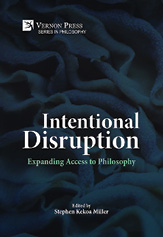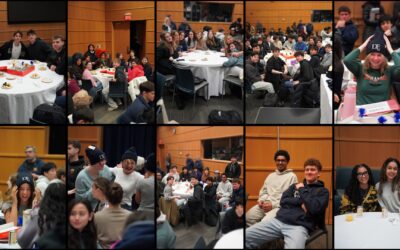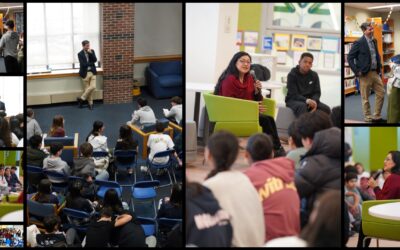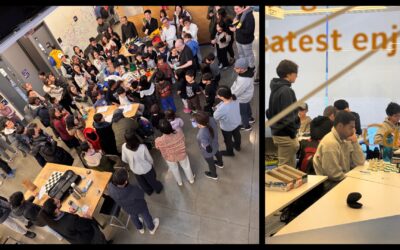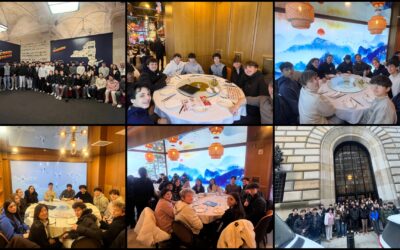That philosophy guides the Ethics Department Chair, Sr. Joseph Murphy, for his first-time tenth grade students. Sr. Murphy explains that, “they [students] think of opinions somehow like it’s property that they ‘own it’ somehow, but they really don’t own it fully until they can argue for it. Knowledge in a certain sense is a process, and you have to arrive at a conclusion through a process.”
Over this past Summer 2021, Ethics Department Chair Sr. Joe Murphy contributed a chapter within the anthology Intentional Disruption: Expanding Access to Philosophy (2021) published by Vernon Press. The anthology edited by Stephen Miller outlines how educators in philosophy have implemented the discipline at the pre-college level.
Students are always “in process” in class, formulating their ideas, at times, only in Spanish. Joe Murphy’s chapter “Once a Philosopher-In-Hiding: Teaching Philosophy in Spanish in the USA” details his journey from being the language department chair to trailblazing the now expansive ethics department curricula. He is one of few educators to integrate second language education with philosophical inquiry emphasizing that, “language is a way that we identify ourselves. When we talk and when we use language, it’s one of the ways that we make sense of the world.”
Philosophical education in high schools is often attributed as “critical thinking”. Sr. Murphy argues that what precedes the idea of “critical thinking” is first philosophical inquiry. He has seen what it provides in little moments: parents amazed with how their children have learned to discuss hard questions over the dinner table. Sr. Murphy hopes and implores other schools, administrators, and philosophers-in-hiding to take the leap. After all, they will become the philosophers and leaders of our future.
Seniors Celebrate 100 Days Countdown to Commencement 2026
Let the countdown begin! The D-E Class of 2026 was recently invited to Hajjar Auditorium to celebrate 100 Days to Commencement. During the event, hosted by the D-E Development and Alumni Relations Team, students were treated to a D-Electable breakfast of blue-and-gold...
Celebrating Black History Month
Black History Month celebrations continued this week in the Middle and Upper Schools with assemblies in Schenck Auditorium facilitated by the Diversity, Equity, Inclusion & Belonging (DEIB) Department. For the US Assembly, members of the Black Affinity student...
Author Visits Help Enrich MS Literary Units
Authors recently visited our Middle School (MS) to enrich current units of study. Seventh graders hosted a Q&A session with award-winning author Reyna Grande, whose memoir, “The Distance Between Us,” is central to their cross-curricular Anatomy of a Human Project....
D-E Celebrates Lunar New Year!
D-E rang in the Lunar New Year with dynamic assembly performances and a jubilant celebration in the Wharton Lessin Dining Hall, graciously facilitated by our Asian American, Chinese, and Korean Parent Affinity Groups. Festivities began in the Lower School (LS) with...
Kindergarten & 1st Grade Valentine’s Concerts 2026
In a beloved D-E tradition, this week our Lower School (LS) Kindergarten and 1st Grade students tugged at heartstrings during their Valentine’s Chorus Concerts for families. Hajjar Auditorium was decked with red, pink, and white balloon displays and paper hearts with...
D-E 360° LS Chess Team Competes at Scholastic Grand Prix
The D-E 360° Lower School Chess Team continues its winning streak with a fantastic showing at the recent Scholastic (K-9) Grand Prix, hosted in the D-E STEM Center. Players came from a wide range of schools across New Jersey and New York, and 28 students from D-E...
Economics & Business Finance Students Visit the Fed
Upper School (US) students in our Economics and Business Finance classes recently took a field trip to the Federal Bank of New York. “While there, they listened to a lecture on basic monetary policy and the role the central bank plays in managing the economy,” said US...
Basketball Student-Athlete Leo Colosimo ’26 Scores His 1,000th Point
CHEERS & CONGRATS to Leo Colosimo ‘26!!! Courtside dreams came true last night when Leo Colosimo ’26 scored his 1,000th career point in the Myrna B. Sherman Gym, where D-E’s Boys Varsity Basketball Team faced the Hackensack Comets. Congratulations to Leo on this...
LS Celebrates Black History Month
During their recent Lower School Assembly, the LS community celebrated Black History Month with storytelling, personal anecdotes, poetry, and a dance performance! The assembly began with a video featuring a reading of “That Swingin’ Sound,” a story about the musical...
We Heart Math: Connecting Through the All-School Math Problem
CHEERS to D-E’s All-School Math Problem, a long-time tradition and cross-divisional activity! This year’s problem focused on symmetry, with a theme apropos for the lead-up to Valentine’s Day—cutting out (and folding) paper hearts! Ms. Patti Barrett, Chair of...

